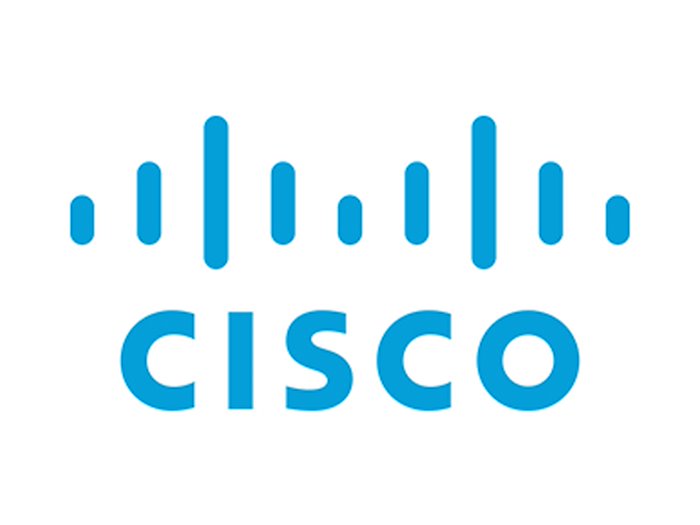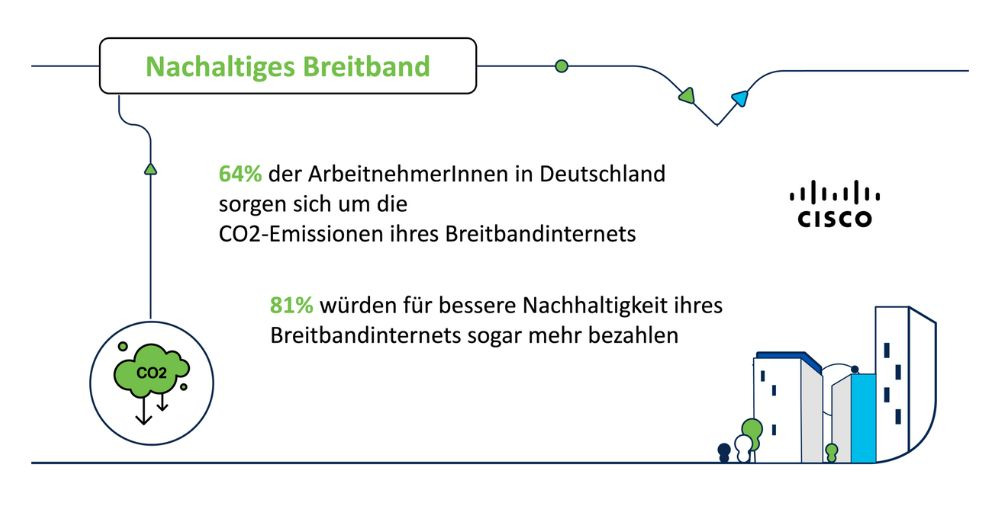
The Internet is a lifeline for Germany – 94 percent of Germans between the ages of 16 and 74 use the Internet, according to the Federal Statistical Office. The Cisco Broadband Survey 2023 confirms this relevance: 79 percent of German employees rate broadband Internet as a national critical infrastructure. At the same time, the issue of broadband Internet sustainability is very important to German workers. 64 percent of respondents from Germany are concerned about the CO2 emissions of their broadband connection. In a European comparison, this puts Germany in the middle of the field. While 78 percent in France and 76 percent in Spain are concerned, the figure is only 56 percent in the Netherlands and 53 percent in Poland.
81 percent of German citizens also say they would be willing to pay more for an environmentally friendly broadband connection. This is above the EMEA-wide average (77 percent) and is also the top figure when compared with other European countries – Switzerland follows with 76 percent, while in France only 64 percent would be willing to pay more. That would certainly be helpful, because the current global IT infrastructure, including devices, Internet and supporting systems, is estimated to be responsible for 2.1 to 3.9 percent of global greenhouse gas emissions, according to a study published in Patterns Journal.
For an environmentally friendly broadband connection, 29 percent of those surveyed in Germany would pay a premium of more than 20 percent compared to current costs (EMEA: 27%). At the same time, more than three-quarters of Germans (76%) say they have reduced their spending on online services due to the increased cost of living (EMEA: 63%). Around one in five (20%) already switched to a cheaper package or cancelled streaming services (19%).
Tips for sustainable Internet use
But what specifically can end users do for a more sustainable broadband Internet? Christian Korff, a member of the management team at Cisco Germany also has some tips up his sleeve on how Internet users can reduce their surfing CO2 footprint
- Replace old devices and give them for recycling. With the router it is like with the refrigerator: The old devices consume significantly more electricity than the new
- Check in comparison portals, which Internet providers work according to ESG criteria and whether they have a comprehensible Net Zero strategy
- Avoid the unnecessary sending of large attachments in mails. The more data sent, the more CO2 it causes.
- Turn off internet hardware when not in use: Turn off WLAN at night, cell phone in flight mode, shut down laptop in the evening.
High need for education
In the topic of sustainability of the Internet, however, there is still much need for education. Just 11 percent of Germans feel well informed and could advise other users on this. 39 percent have already heard something about the CO2 emissions of the Internet, but could not explain this to others. Some half-knowledge is possessed by 29 percent, and 21 percent say they have no idea.
“IT has to be part of the solution when we look at the climate crisis,” says Cisco’s Christian Korff. “That’s why we are continuously developing our portfolio to make Cisco a Net Zero company by 2040. But users in Germany also want to do their part by choosing sustainable services. This is clearly shown by the Cisco Broadband Survey.”
Security in the Home Office
Other focal points of the Broadband Survey 2023 are IT security and hybrid work. Virtual collaboration in the home office has led to an increased merging of work and personal life. However, the home office harbors new risks, as online banking and work processes, for example, run over the same broadband connection. But how do German workers protect their Internet connection? Passwords remain the most common protective measure (Germany: 46%, EMEA: 53%). Thirty-one percent of Germans use network encryption (encyption) and only 20 percent each rely on VPN or the router’s firewall.
Despite the rather weak precautions overall, just under half (48%) feel safe storing their documents, photos or videos in the cloud. However, the Germans are significantly more skeptical than the average in EMEA (59%). Accordingly, security is clearly the most important point when deciding on a new Internet service in Germany (38%). This is followed by reliability (28%), previous experience (25%), speed (23%) and brand awareness (19%). EMEA-wide, on the other hand, speed (40%) ranks ahead of safety (38%).
For a better life
Overall, Germans rate the impact of ubiquitous networking positively. More than half (55%) believe that connecting their home entertainment devices online improves their lives. Fifty-four percent see this in health and fitness trackers, 50% in home security solutions, and 47% each in lighting and energy consumption.
Most respondents are satisfied with both the speed (58%) and reliability (62%) of the service. However, they have to wait an average of about 40 minutes per day due to delays such as slow loading of web pages, buffering during video streams or updates on social media without being asked. Forty-nine percent wait a maximum of 10 minutes a day for Internet services (EMEA: 56%), while 32% wait more than 30 minutes (EMEA: 26%).
“The Cisco Broadband Survey 2023 reconfirms that broadband infrastructure in Germany, while satisfactory, lags behind other countries in Europe, the Middle East and Africa (EMEA),” said Korff. “Our demand for critical national infrastructure must be different in speed, reliability, security and sustainability.”
About the Survey
The Cisco Broadband Survey is based on a survey of 21,629 workers in 12 countries in the EMEA region: Germany, Switzerland, France, the United Kingdom, Italy, the Netherlands, Poland, Sweden, Spain, Saudi Arabia, South Africa and the United Arab Emirates. It was conducted in January and February 2023. In Germany, 2,051 people were surveyed. The sample included respondents from all regions of each country who work either entirely remotely, entirely in the office, hybrid home and office, or as frontline workers. The survey was conducted by independent market research firm Censuswide. It employs members of the Market Research Society and adheres to the ESOMAR principles it endorses.
– – – –
Further links
👉 www.cisco.com
Graphic: Cisco




